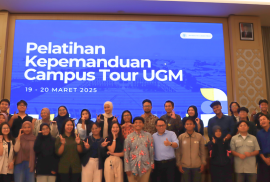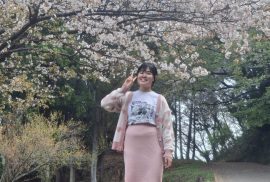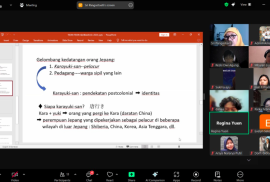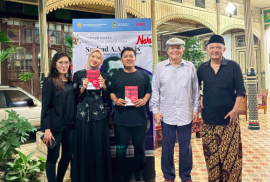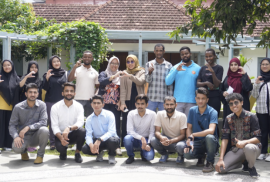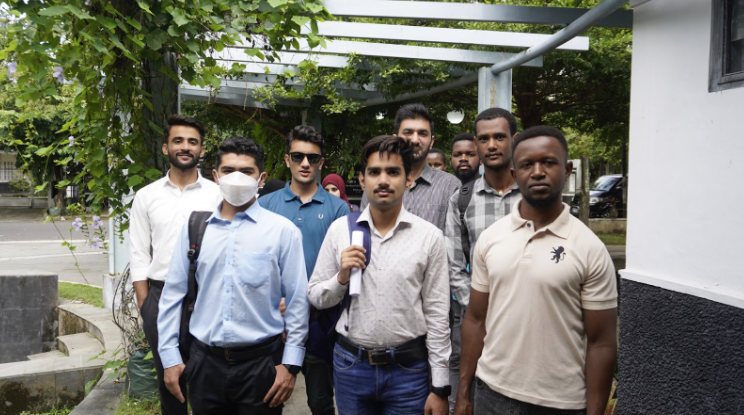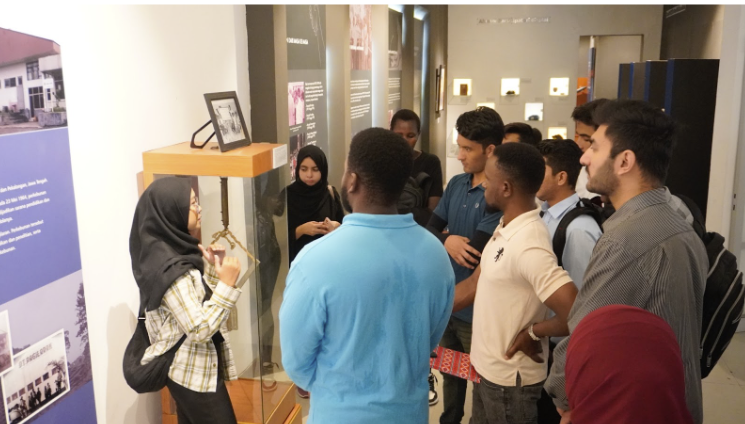Yogyakarta, 10/4/2025 – In order to welcome the new system of campus visit implementation, Universitas Gadjah Mada (UGM) held UGM Campus Tour Activity Guiding Training which lasted for two days, namely on Thursday, March 20, 2025 online through Zoom and Friday, March 21, 2025 offline in Multimedia Room 1, UGM Main Office (Balairung). This training was held as part of UGM’s efforts to realize a campus tour system that is more coordinated, informative, and representative of university values.
This activity is an important part of the implementation of UGM’s new policy in organizing campus tours, which were previously decentralized in each faculty and business unit. Now, the implementation is consolidated through a centralized system that involves student representatives from all faculties as guides. Therefore, the students involved are required to have good story telling skills, understand the values of UGM, and have basic visitor management skills, so this training is a crucial step in the process.
Understanding Values and Basic Guiding Techniques
The first day of the training was opened online by the committee, followed by remarks from Mohamad Rachmadian Narotama, ST, M.Sc., Ph.D., lecturer in Tourism Study Program at Faculty of Arts UGM as well as the Head of UGM Campus Tour Task Force Team. In his speech, he emphasized the importance of the guide’s role in the new UGM Campus Tour scheme which is not only as an introduction, but also as an ambassador of information and representation of university values.
The first session presented Runavia Mulyasari, S.Ant., M.A. and Popi Irawan, S.S., M.Sc., Ph.D., both lecturers of Tourism Study Program and members of the UGM Campus Tour Task Force, who provided an in-depth understanding of the interpretation of UGM values in the context of guiding and the basics of guiding.
Meanwhile, Runavia Mulyasari, S.Ant., M.A. explained the importance of attitude, communication skills, and code of ethics that must be owned by campus tour guides. The participants were introduced to the principles of hospitality and professionalism as the key to maintaining UGM’s image in the eyes of visitors.
The next session was filled with a sharing session entitled “The Art of Telling Stories about Daily Activities” presented by Evander Dwi Pramana, S.Par, an alumnus of UGM Tourism Study Program who is now active as a guiding practitioner. In this session, participants were not only invited to hear field experiences, but also to share stories about campus life which could later be developed into story telling material for campus tour visitors.
Deepening SOPs and Guiding Practices
Meanwhile, offline training activities began with remarks from Popi Irawan, who emphasized the importance of this training in ensuring the quality of the campus visitor experience in the future. The first session was filled by Runavia Mulyasari, who explained the Standard Operating Procedure (SOP) developed by the Task Force Team for campus tour guiding activities. Not only one-way, this session also encouraged participants to actively discuss to complete the SOP, such as dealing with emergency conditions and the limits of guide intervention.
The second session was a hands-on guiding practice facilitated by Evander. Through a paired method, participants practiced being a guide and a visitor alternately. Open discussions were also held to discuss effective guiding strategies in various situations. This practice also honed the participants’ skills in delivering information in an interesting, relevant and communicative manner.
Synergy for Sustainable Tourism
The active involvement of lecturers, students, and alumni of the UGM Faculty of Arts Tourism Study Program in this activity shows a commitment to sustainable education that is in line with the goals of SDG 4: Quality Education and SDG 17: Partnerships to Achieve Goals. Collaboration across generations and faculties is an important foundation in creating a campus tour ecosystem at UGM that is inclusive, informative, and meaningful.
With this training, it is expected that all students involved as guides can be the best representation of UGM. Not only as a higher education institution, but also as an open, friendly, and inspiring life learning space.
[Public Relations of Tourism, Muhammad Alif]

